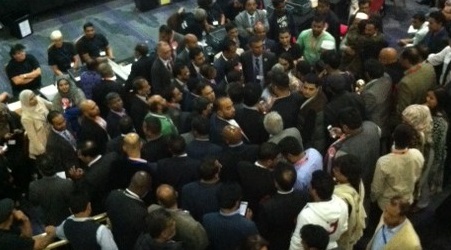The results of the elections on 22nd May 2014 have opened up a debate in Tower Hamlets about the relationship between Lutfur Rahman and the Labour Party. Good: ELN wrote about this in the early hours of 24th May (Labour: time for Plan B? published on our website). Although many are discussing this, two figures in the local Labour Party have already gone into print on the question. Here, we comment on one of those contributions to the debate, from Dan McCurry (http://danmccurry.wordpress.com/).
It is important not to confuse access to the internet with having influence. Although Dan has a long history of writing about the local Labour Party on various websites, virtually no one in the local Labour Party pays any attention to him. In particular, his views on the Bangladeshi community, the Lutfur case and racism in general are very idiosyncratic and insofar as they have been taken up by other members of the local Labour Party they have usually provoked derision rather than been hailed as providing insight. For example, in an article entitled “The writing’s on the wall for Lutfur Rahman”, published on “Shifting Grounds” on 28th April, McCurry wrote:
“Lutfur has always represented a section of society, rather than society as a whole. For example, the Bangladeshi women around Lutfur all seem to wear veils. As individuals, they are nice, intelligent women. But as a group, it disconcerts Labour women. The feminists are quick to take silent offence.”
This is wrong on so many levels it is not worth elevating it to the level of something which needs a reply beyond “patronising drivel” – and it is typical of McCurry’s views and analysis. He goes on, in this article, to say that the Panorama programme will have galvanized the Bangladeshi vote, but that Labour can win if there is a decent turnout. Within days, there was a decent turnout – and Labour didn’t win.
It would seem unlikely, then, that a post-election article written by McCurry would provide helpful insight into the problems or the way forward. However, it is being put round in some circles – perhaps people have seen the title but not read the article – so it is hard to resist pointing out what is wrong with it.
Panorama
McCurry starts by saying that Panorama galvanised the Bangladeshi vote to the extent that Lutfur Rahman won because of it. To attribute Lutfur’s victory to Panorama is to underestimate the strength of the support Lutfur has. The Bangladeshi community was already aware Labour had a problem with treating local Bangladeshi members fairly – they didn’t need Panorama to tell them (though it may have strengthened their resolve to make sure they voted). You don’t assemble 36,539 first preference votes (in a borough where the two Labour MPs received 40,463 first preference votes between them at the last General Election) on the strength of one half hour BBC documentary.
McCurry claims Panorama investigated Lutfur and found nothing: rather than run a story about him being falsely accused, they decided to accuse him of abuse of power. Oh dear. First, this was not so much Panorama’s programme as John Ware’s programme. Ware took voluntary redundancy from the BBC in 2012, with Panorama’s editor Tom Giles quoted in The Guardian saying that he hoped Ware would work again with the programme on a freelance basis – as, in this instance, it seems that he did. Ware is linked with journalists such as extreme right winger Melanie Philips and Andrew Gilligan.
Second, Ware didn’t just choose to investigate Lutfur out the blue and then, his investigation having found nothing, “come up with” an “abuse of power” story. His investigation began with the help of some members of the local Labour Party and his programme was entirely based on what they had to say: either to camera, or comments they had made at Cabinet or Council and which, thanks to Labour and Tory pressure to video these meetings, had been officially recorded. His investigation was about “abuse of power” from the start. It made the points about East End Life which the Labour and Tory Groups had made for months. It allowed Josh Peck to raise his doubts about the grant process: doubts so severe he had not reported them at the time but which had to be raised on national TV.
McCurry is right to say that it was unfair to attack East End Life given that Labour Mayors in neighbouring boroughs produce similar Council newspapers, but to say this is to miss the point. The Panorama programme was never an investigation aiming to find out what was happening: it was from the start a collusion between one journalist and one element of the Labour Group to attack Lutfur Rahman.
Expulsion
McCurry goes on to say that the Labour Party gave no reason for expelling Lutfur Rahman, which made the media think there was something suspect about him. This is very confused reasoning.
The Labour Party did not expel Lutfur Rahman. The Party ran a selection contest which Lutfur won; an official with authority duly declared the process to have been in order and Lutfur to be the official candidate. The then councillor Helal Abbas then put a complaint into the Labour Party, suggesting that Lutfur Rahman was not a safe candidate. The Party sat on the complaint for ten days, neither investigating the allegations in it nor informing Lutfur that it had been received. Party officials then presented the complaint to the September 2010 meeting of Labour’s National Executive who, having read it (but not any scrutiny of it, as there had not been any) removed Rahman as the official candidate. At the same time they promoted the complainant, Cllr Helal Abbas, to be the official candidate instead – though he had come third in the selection and leapfrogged the candidate in second position (John Biggs). While the Party was in receipt of the complaint and while they were busy not investigating it, the Party prepared Helal Abbas’s nomination papers.
The Executive met on the Tuesday, and nominations closed on the Friday. There was no time for Rahman to answer the allegations, which were never put to him for answer anyway, or challenge the decision to remove him. He decided that the way to implement the mandate of the local members who had selected him was not to collude with the National Executive in over-ruling the decision those members had made but, instead, to stand as a candidate for mayor without Labour’s official endorsement but on the Party’s manifesto. Standing against an official Labour Party candidate (even if you have also been endorsed as the official candidate!) leads to automatic exclusion from the Party, without process – not to expulsion (for which there is a process which includes an appeal, if necessary).
Cllr Helal Abbas’s complaints about Rahman were modelled on the points made in a Channel 4 Dispatches programme aired earlier in 2010, in the run up to the General Election – in which various local Labour figures had essentially said that there was Islamic infiltration of the Labour Party but this had been dealt with.
This is where Dan McCurry gets it wrong. It is not that the Labour Party expelled Lutfur Rahman and then the media decided that they must have had reason to expel him so there must be something wrong with Rahman. It is that various sections of the Labour Party and key journalists worked together to produce television programmes, as a result of which the Labour Party found a way of getting rid of Lutfur Rahman. In doing this the Party was also reminding other Bangladeshi members that if they did not toe the party hierarchy’s line, they would never be selected as candidates for public office (by the national party which, uniquely in the UK, keeps this right for itself rather than letting local members choose their own candidates, so successful candidates are accountable to the national party rather than local members).
Nasty people
McCurry says there are allegations that Lutfur Rahman mixes “with people who have nasty opinions, including a racist Saudi Imam”. McCurry says he totally agrees with these allegations: has he investigated them himself, or is he taking them on trust? McCurry then lectures us/Rahman that it might be “more effective to deal with this type of thing through a quiet conversation that seeks to explain the concern rather than by kicking someone out of the party and shouting allegations at him publicly.” Oh dear.
What on earth is McCurry imagining? Send a Labour Party official round to Rahman’s to go, “Look here, old chap; seems you’ve been sort of, you know, speaking to some of these mad darkies – not the sort of thing we do over here, old chap,” – and expect Rahman to answer, “dashed sorry to step out of line, sir.” This is at best patronising and at worst it is much worse.
Answering questions
McCurry assumes that Mayor Rahman has refused to answer councillors’ questions at full Council meetings because he has contempt for the people asking the questions. This is again rather patronising, and it echoes the Labour Party practice of bringing everything down to personality and/or the political methods of student unions. Mayor Rahman has a Cabinet, and its members handle detailed portfolios. The opposition’s questions are not asked because they genuinely want answers, but to try to grandstand their views that Rahman is incompetent. When a Cabinet member comes forward to give them a detailed answer, they complain they want the Mayor: and they are therefore belittling those Cabinet members. Mayor Rahman is standing by his Cabinet – just as they stood by him when Labour’s executive stopped him being Labour’s candidate. This is not contempt for the persons who are opposition councillors – though it may be contempt for the opposition’s methods. In any event, the Mayor is not accountable to the Council, but to the electorate. Mayor Rahman is not playing the opposition councillors’ games, but that does not mean that he has contempt for those councillors.
Elections
McCurry then indulges in a bizarre calculation of how Lutfur succeeded electorally. Oh dear. He says that in 2010, the Labour vote, Bangladeshi and white, failed to turn out; but in 2014, 90% of the Bangladeshis (all of them? or just the ones who voted?) voted for Lutfur – which is “must more than just his own tribe”. Tribe? Tribe?? Tribe??? What is this “tribe” that Dan McCurry thinks Lutfur Rahman has? The rest of us left this kind of language behind in the 1980s: why is it coming out again now? How can you take the writing of someone who thinks Lutfur Rahman commands a “tribe” as a serious contribution to debate? Similarly, McCurry’s ill informed fantasy that Lutfur was too shy to speak at Labour Party meetings but relied on Marc Francis PI to gather intelligence for him is also patronising at best (and probably news to Marc).
Return to Labour
At last, but for all the wrong reasons, McCurry comes to the right conclusion: Labour should invite Lutfur Rahman – and all those who were excluded because they supported him – to return to the Labour Party. However, McCurry again gets it wrong in one vital respect. He says Lutfur is what the Party has “wanted for years, a successful minority leader […] doing a good job”. No, Dan McCurry: that is not what the Labour Party wanted. It wanted a yes man – a copy of the yes men it has in Hackney, Lewisham and Newham, a yes man of its own choosing. “It’s time for Lutfur to come back,” says McCurry – as if Lutfur was one of those little models on a weather vane who pops out when it’s going to rain and must now pop back in again as the sun is shining; as if a Labour Party official was going to open a window and holler, “Lutfur – you’ve been a very naughty boy, come back indoors now.”
Labour, over the years, has been remarkably inconsistent over readmitting members who have stood for other parties. Nationally, Labour famously readmitted Ken Livingstone after he stood as an independent candidate for London Mayor and won. Ken had won the popular vote of party members in the Party’s selection contest, but the ordinary members were outvoted by MPs, each of whose votes had the same weighting as 1,000 ordinary members. Ken stood because he had the support of the clear majority of ordinary members and because he knew he had the best chance of winning – and saving London from a Tory mayor.
There are several more examples locally of Labour members who have been deemed not good enough to stand as Labour candidates for the Council and who have stood and won as candidates of other parties instead (and Labour members who have supported opposition candidates) – and have then been readmitted to the Labour Party within months in the run up to subsequent elections. If Labour wanted to re-admit Lutfur Rahman on grounds of expediency, it could cite a raft of evidence in support of any decision to do so.
However, Lutfur and his supporters cannot enter the Labour Party if the Party does not change. Reconciliation needs to begin with a process which provides an explanation of why Lutfur came to be removed as Labour’s candidate in the 2010 mayoral election. That bureaucratic interference from somewhere in central office has tainted the Labour Party in the eyes of local members. Many first time Labour candidates and party activists believed John Biggs and their local leaders when they said the electorate was fed up with Lutfur, and they trusted Biggs & Co to lead Labour to victory. The Party needs to provide honest answers about the past if it is to be rehabilitated in the eyes of local voters and even in the eyes of its own members.
The National Executive investigated some of the Gilligan/Helal Abbas allegations about the local membership, and found them unproven. The local Labour Party membership needs to ask the Executive to investigate all the allegations that were put to it, so that members can make a sober judgement on whether the allegations had substance or were part of a political stitch up. Unless and until that is cleared up, the local Labour Party will remain tainted and in a quagmire which no amount of better organisation or “try harder, chaps” pep talks will extract it from.
The second demand that disappointed local Labour Party members should made is that democratic functioning should be restored to the local Party. The national Party cannot claim that the local membership is tainted and therefore the national Party must select Labour’s council candidates. This is nonsense, because the local membership has been allowed to select candidates for London, Westminster and European elections – during the years when local party members were deemed not fit to select Council candidates.
The national party has said that it is better to have outsiders selecting Council candidates because they can be objective, whereas letting local members chose their candidates just encourages electors to join the Labour Party so that they can have a say on who stands for the Council. That is rubbish in two respects. First, the national Party has made many errors of judgement over selections: its outsiders don’t know the local potential local candidates, so they tend to appoint those who do well in party selection interviews rather than those with a good strong record in the community. Second, those selected by party officials remain accountable to party officials: they have to behave in a way which means the party officials will select them again next time, rather than listening to party members and the local community.
Labour has new rules now which encourage Labour supporters to have a relationship with the Party on the basis that they will have a say in the selection of party leaders. It should apply the same ethos to Tower Hamlets and open up the Party to local members once again.
No, Dan McCurry, it’s not “time for Lutfur to come back”. It’s time that local Labour Party members and the Tower Hamlets electors got a proper Labour Party back.
 East London News A Force for the community…
East London News A Force for the community…




